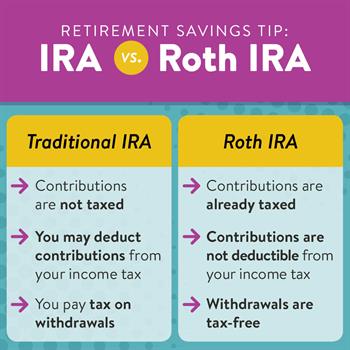It's a Money Thing®
Saving for Retirement
Someday, you will be an old person. Sorry to remind you, but it's true- and the sooner you accept the fact, the more prepared you'll be to build the kind of retirement lifestyle you want. Timing is everything!
Picture your retirement. Have you ever thought about what you want it to look like? It might be hard to do (especially is your retirement is decades away), but designing the life you want can be motivating. Do you envision traveling the world, living the simple life, or settling in a new city?
All of these will cost money, which is why a retirement savings account is so important.
Traditional IRAs, Roth IRAs, and 401(k)s are all products designed to be an incentive to save up for retirement. These accounts act as containers for your investments.
As long as your investments remain in the container, they can grow and accumulate tax-free.
Each account type works a little differently. Let's take a look at them individually.

Traditional IRA:
You can set up a traditional IRA at your credit union. Because these accounts are self-directed, you can choose from a wide range of investment options.
- Annual Contributions are limited to $7,000
- Contributions are made with pre-tax dollars and may be deducted from your income tax return for that year
- Withdrawals in retirement are taxed as ordinary income
- Withdrawals can be made after age 59 1/2 to avoid penalties
- An additional 10% in taxes is charged if you withdrawal funds early
- Traditional IRAs have required minimum distributions (RMDs), meaning you must start withdrawing funds after your reach age 70
Roth IRA:
You can set up a Roth IRA at your credit union. A Roth IRA may not give you tax breaks on your contributions, but the fact that you don't pay taxes on qualified withdrawals is a huge perk.
- Annual Contributions are limited to $7,000
- Contributions are made with after-tax dollars and cannot be deducted from your income ta
- Withdrawals can be made after age 59 1/2 to avoid penalties
- Qualified withdrawals in retirement are tax-free
- Your may have to pay taxes and penalties on the earnings in your Roth IRA when you make early withdrawals
- Unlike traditional IRAs, Roth IRAs have tax-free withdrawals and no RMDs.

401(k):
If your employer offers company match (free money!) on your 401(k) contributions, take advantage of it.
- Annual Contributions are limited to $23,000 (if your under the age of 50)
- Your 401(k) contributions are pre-tax. They come directly from your salary are not counted toward your taxable income that year.
- Withdrawals can be made after age 59 1/2 to avoid penalties
- Distributions in retirement are taxed as ordinary income
- Most early withdrawals are taxed as ordinary income with an additional 10% penalty fee
- Limited investment options and higher fees are sometimes associated with 401(k) plans

